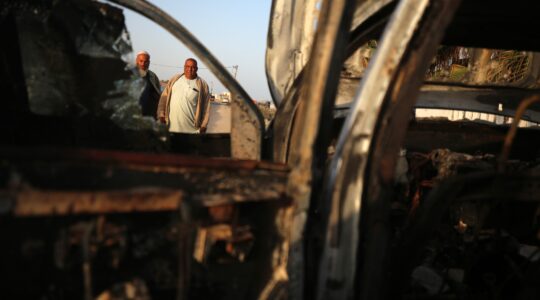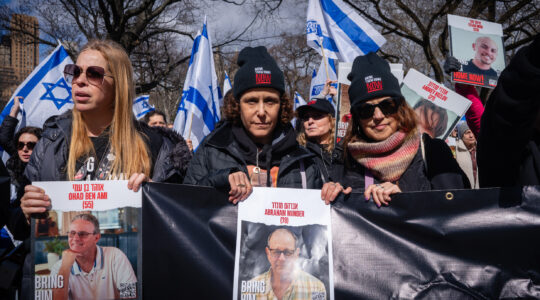
For Sabbath-observant students and families in Ann Arbor, the University of Michigan’s pervasive football culture poses a problem: home games at Michigan Stadium conflict with Shabbat.
Or so it was before last Saturday night’s match-up against Notre Dame.
[[READMORE]]
Jews have long been embedded in the Michigan football tradition, even on the field. Russian immigrant Joe Magidsohn was the first Jewish player to earn his varsity ‘M’ in 1909, refusing to play on the High Holidays. Benny Friedman, legendary Wolverines quarterback and captain of the late 1920s, was posthumously inducted into the pro football hall of fame. More recently, offensive guard Adam Kraus made cameos at Hillel and Chabad in the aughts, and boasted his New Orleans roots with a "Shalom Y’all" shirt around campus.
Regardless of Jewish representation on the team, Jewish Wolverine fans are as rabid as any other; Groupon co-founder Eric Lefkofsky was part of a trio who introduced short-lived mascot "Willy the Wolverine" in the late 1980s.
Among the less-heralded innovators each year are Shabbos-keeping fans, a portion of whom independently concoct solutions to reconcile their football game attendance to the exigencies of the day. Students arrange for friends or “will call” to physically hold their tickets to avoid the Biblical prohibition of carrying outdoors; others slip out of shul following kedusha; and a select group wakes up at the time hashkama minyan would theoretically convene to play beer pong on the front lawns of fraternities, sororities and student housing.
To be fair, not all Jews attend Michigan football games. Among the noteworthy absentee fans: my hometown rabbi and rebbetzin.
Rabbi Rod Glogower has served as spiritual leader of the Ann Arbor Orthodox Minyan for some 27 years. Beyond the mounds of baseball collectibles that line the walls of his home, my hometown rabbi’s passion for sports is on display in pre-prayer small talk and through a magnificently arced jumpshot at the AAOM Shavuot picnic, a vestige of his high school days in the Pittsburgh JCC league.
My favorite Michigan sports memory is of the rabbi elbowing me, violently reenacting fouls committed against Tamir “The Jewish Jordan” Goodman when the Towson Tigers played against our Wolverines on the last night of Hanukkah 5761. Rabbi Glogower’s wife, Nehama–my Judaic studies teacher in fifth and seventh grade and a hospice chaplain—was also at that game with us, one of several live sporting events they’ve seen together.
While it isn’t his style to preach dos-and-don’ts from pulpit, the rabbi, understandably, would be hard-pressed to create a halakhic loophole for himself to attend a Michigan football game on Shabbat. So when he and the rebbetzin were offered tickets to this historic game, they seized the moment.
Shortly thereafter, a snag was discovered: Kick-off was scheduled before the conclusion of ma’ariv, the evening prayer service.
“[The Rabbi] does not like to get places late,” said the rebbetzin (the rabbi couldn’t be reached before deadline). “He was really concerned about missing the first quarter.”
Perhaps he shouldn’t have been. The first quarter was miserable for the Maize and Blue, who gave up two touchdowns to the Irish early. “I think it may have been for the best,” surmised the rebbetzin about their arrival time, after my dad gave them a post-ma’ariv lift to the stadium. “In fact,” she recalled, “Michigan scored our first touchdown minutes after we got there." Jokingly, she suggested, "It’s like they said, ‘Okay the frummers are here; we can start scoring,’” followed by, “Well that’s my interpretation anyhow.”
Upon their arrival, the Glogowers were officially among the NCAA record 114,804 fans who witnessed Michigan’s thrilling come-from-behind victory. The Wolverines capped off their 35-31 win with a 16-yard touchdown pass with two seconds left on the clock.
Atmosphere and all, the rabbi was quiet but content, his white button-down short-sleeve shirt standing out amidst a sea of maize and blue pom-poms handed out at the game.
“There were no arm-pumping ‘Hail to the Victors’ chants,” reported the rebbetzin about her husband’s reaction, “but it was an exciting game. Just the whole atmosphere was amazing—it was amazing.”
While it may not have ignited wild cheering from the rabbi, being at the football game was transformative in a way. Said the rebbetzin, “It gave me some insight on students’ experience; I have a little more respect for university’s relationship with the football team.”
Even if the night game tradition were to continue, “I’m not sure I’d want to go again,” said the rebbetzin, much to my surprise. “Part of the excitement was that it was a once in a lifetime thing. Personally, I think it might dilute the experience.” She clarified, “I’m not saying I’d necessarily turn down the tickets, but I don’t feel that I necessarily need to go again. And Michigan won.”
Michigan’s first home game branded “Under the Lights” was a stellar success by virtually all measures and is likely to become a tradition.
Let’s pray that next year’s big night doesn’t fall out on Yom Kippur.
[PHOTO: The Glogowers at their first Michigan football game. Courtesy of Nehama Glogower.]
Normal
0
0
1
27
159
1
1
195
11.1025
0
0
0





